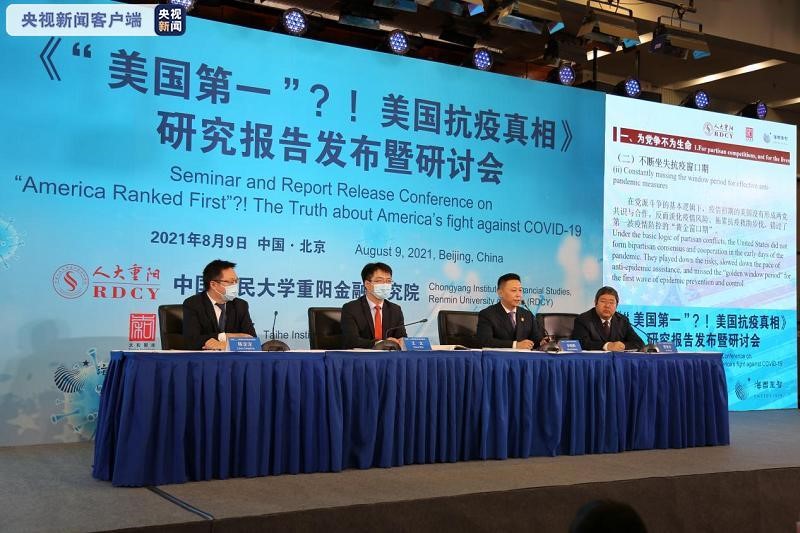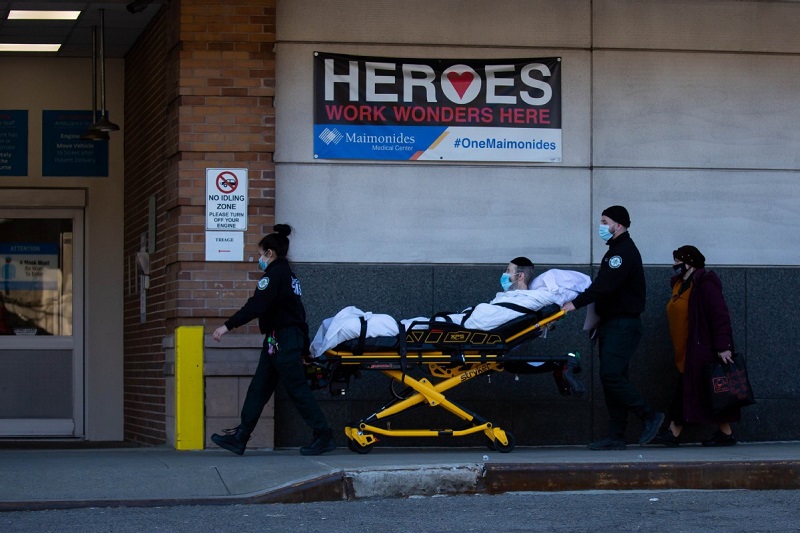In a week to be remembered, three prestigious Chinese thinks tanks released a timely report on the U.S. response to the COVID-19 pandemic on August 9. The research was jointly carried out by the Chongyang Institute for Financial Studies of the Renmin University of China, the Taihe Institute, and the Intellisia Institute. Titled "America Ranked First'?! The Truth about America's Fight against COVID-19," the report captures the international reader’s attention by referring to one of the two most pressing issues of global concern right now: the threat to human life posed by the novel coronavirus. Meanwhile, during the same week, the United Nations report on climate change which depicted unprecedented and potentially irreversible damage to the earth also came as a wake-up call for mankind. In a word, both issues and both reports deserve urgent attention and point toward a need for deeper multilateralism.

Chinese thinks tanks release a report on the U.S. response to the COVID-19 pandemic on August 9.
The Chinese report analyses five major aspects of what regards a U.S.' failure in responding to the pandemic, including its partisan competition, its anti-science and abnormal measures, system flaws, and its wilful destruction of global resistance to the pandemic.”
This report also comes in the context of Beijing’s rejection of the WHO's plan for the second phase of a study looking into the origins of COVID-19 in the Chinese city Wuhan. China sees it as a clearly politicized issue by the Biden administration’s diplomacy. It is actually not surprising since from the very beginning denial and wanton distortions at the highest level of Washington have been overshadowing science, and pervading and jeopardizing political and social measures against the virus have been taken across the country. Following a gross internal debacle, a deluge of irrational and volatile accusations were poured against China during the Trump administration. Amid the global community’s anticipation for a more reasonable attitude from the new administration about the pandemic, there was a clear improvement during the early months of this year. However, the irrational and highly politicized voice soon gained the upper hand again, which is adversely affecting not only the United States but the rest of the world.
For many observers around the world, by criticizing China, Washington is trying to distract public attention on global and extremely pressing issues (including climate change), masking its failure in fully containing the virus at home. The Chinese report states that Washington should focus on addressing domestic issues, doing its best to protect and save its own people's lives from COVID-19 infections.
In addition, during this same week, the famous and highly influential U.S. analyst Ian Bremmer highlighted his dismay via Twitter at the latest KFF poll (allegedly publishing the U.S. most up-to-date and accurate information on health policy) that indicates more than half of unvaccinated American adults think the COVID vaccine is more dangerous than the virus itself. On August 12, the backdrop was grim, partly because the U.S. is recording more than 100,000 new COVID cases daily on average. Furthermore, U.S. states that have a high percentage of vaccine resistant people have experienced big surges in infections over the past two weeks. Particularly concerning is that there are clear loopholes in the White House campaign to convince the anti-vaccination audience. Bremmer went further by concluding that “the outrageous politics-first U.S. approach to COVID response promotes misinformation, and it is a tax on the poor and uneducated.” He actually concludes that Americans are hurting themselves far worse than any external perceived threat.
A year and a half after the pandemic started, the issue of mutations has come to the forefront. Several variants are spreading faster, leading to key questions about vaccines in the future. So far, they all work, but the situation is in a flux. Thus, the question that remains is the urgent need for closer cooperation among nations, starting with scientists from each country. This means there is an urgent need now more than ever for deeper multilateralism enhancing a neutral WHO.

Medical workers wheel a patient into the emergency room at Maimonides Medical Center in the Brooklyn borough of New York, United States, March 8, 2021. [Photo/Xinhua]
It is self-evident that the international community should cooperate in fighting the COVID-19 by developing up to date effective vaccines against new variants, and then make them available to everyone around the world, particularly the people in underdeveloped countries, as the Delta variant is driving the global infections to a new high. Let’s keep in mind that in Africa, the continent home to 1.3 billion people, just around 1 percent of them is fully vaccinated. As a major power, the U.S. has a moral obligation to help but is not properly acting.
The three Chinese think tanks convincingly concluded in the report that the U.S. is losing time and lives, making the rest of the world dramatically lose as well. In the words of Ian Bremmer, concerning the fight against the virus, right now in August “the U.S. is the biggest problem. The U.S. is not doing anything close to everything we can for the rest of the world.” As the saying goes, when there's a confession, you need no proof. Everything started with Trump, but the internal and international debacle is not over.
______________
AUGUSTO SOTO is director of Dialogue with China Project and representative in Spain of China Today.